Why it matters
The East Mediterranean covers a region that stretches from Italy’s heel tip eastward to the Levant¹. Throughout history, it has played a crucial role in world politics. Given its geographic position as a crossroad between Africa, Europe, and Asia, East Mediterranean has become numerous times the epicentre of great competition and conflict.
During the Cold War, East Med was vital for the United States. Its geographic location became a landmark of delimitation between the US-USSR influence zones that would refrain Communism from penetrating the three continents. After the collapse of the Soviet Union, the US attention shifted to other regions that were undergoing more pressing crises (such as the Balkans, the Persian Gulf, and the Horn of Africa).
The last decade has seen a rising tension in the region, which has picked the interest of political experts. As a result, many voices urged the United States to renew its attention in the Mediterannean. The below section lists the ongoing conflicts the region encounters.
The 21st-century challenges in East Mediterranean
Multiple parameters contribute to the particularity of this region:
-
- the revival of long-term territorial conflicts coupled with the discovery of hydrocarbon deposits in the region;
- the emergence of new alliances which alter the regional dynamics;
- the absence of dominant power in the region and the attempt of other players to fill in this void.
After the fall of the Ottoman Empire, territorial claims emerged among bordering states, leading to long-term conflicts that last to date. Over the years, ruling governments used such claims as leverage to serve their political agenda.
In the prospect of gas reserves, long-term conflicts resurfaced. As anticipated, the driving force behind this surge is the need for energy resources to cover domestic demand. Between 2009 and 2010, Israel was the first state to discover significant stocks in the Leviathan field. In 2011, Cyprus followed. Yet, the largest gas deposits were uncovered off the Egyptian coast in the Zohr gas field four years later.
Another factor that drives the energy competition is associated with the maritime sovereignty claims from coastal states. This trend has favoured the rise of new alliances that seem to change the strategic dynamic in the Mediterranean and potentially lead to a clash of interests. As Altunışık stresses, this new reality brings back the zero-sum mindset, which dominated the world during the Cold War Era (Ogurlu, 2021).
The deterioration of the Turkish-Israeli relation has severed the strategic partnership between Turkey and Israel, which now replaces a new alliance between Greece, Cyprus, Egypt and Israel. From the US perspective, this new alliance represents a force of regional stability and a counterbalance to the plans of internal and external players aspiring to become regional leaders. Regionally, the strategic shift of Turkey from a pro-western ally to a unilateralist regional player is a worrying factor.
From external powers, Russia has already established a presence in Syria. Also, China has set a foothold in the East Mediterranean with the acquisition of Piraeus port in Greece and Haifa in Israel. Finally, Iran has also advanced in the East Med by participating in proxy wars in Iraq, Syria, and Lebanon. The fact that other players can interfere in a region that has been traditionally under the US flank threatens not only the US role but also its allies.
After reviewing the ongoing challenges in the region, the following section discusses the role of recent hydrocarbon findings and how this development affects regional stability.
The role of recent hydrocarbon findings in the East Mediterranean
Scenario 1: A driving power for regional cooperation
The discovery of hydrocarbons has raised high expectations that East Med gas would become a game-changer for regional development.
Despite gas stocks remaining uncertain, a US survey has suggested that gas exploitation could satisfy the regional demand almost indefinitely – especially in Egypt and Jordan (US Energy Information Administration, 2013). Towards this direction, Israel and Egypt appear to focus their gas production on domestic demand. In Cyprus, it is yet to determine where the main focus of gas exploitation will be due to delays in gas extraction.
For markets with validated deposits, the option to export their surplus regionally via pipelines or transport it to other markets after being compressed² would be a reasonable outcome.
Europe has already expressed interest in the region³ and aspires to become the primary buyer of East Mediterranean gas. Although current estimates are not adequate to change the energy situation in Europe, they could prove vital for the diversification of its energy supplier. If future explorations unearth additional reserves, in that case, the Mediterranean gas could become a game-changer for European energy security.
For international exportations, this does not seem to be a wise option for the time being. A restricting factor is the multi-polarisation of the energy industry. Plus, Zemach warns that the deployment of LNG infrastructure to liquefy gas would be a costly and time-consuming option (Giannakopoulos, 2016).
Seeing the potential in the region, political experts and analysts have called for regional cooperation. While Egypt, Cyprus and Israel will be focusing on gas production, Greece and Turkey could emerge as energy hubs for the transmission of East Med gas safely to Europe and at affordable prices.
Undoubtedly, abundant energy resources can be a leading force for resolving regional conflicts and boosting the local economies. To achieve this, local governments will need to restore the political stability in Egypt and Turkey, which will guarantee a solid regulatory framework for investors and buyers. Otherwise, superficial cooperation could not prevent new conflicts from unleashing in the future (Matalucci quoted in Giannakopoulos, 2016).
The above analysis explored the potential of hydrocarbons as a force for cooperation. The following section intends to shed light on the scenario where hydrocarbon reserves may become the bone of contention and uncertainty.
Scenario 2: A force of uncertainty
Although all hopes rest for the optimistic scenario, there are still suspicions that hydrocarbon reserves might lead to an uncertain future.
This scenario is already underway. Current indicators show that a crisis is on the rise. The region is overwhelmed by complex geopolitics, uncertainty over the gas reserve level, an asymmetrical demand and supply for the newly discovered gas⁴.
Starting with the complex geopolitics, the discovery of energy resources has already triggered old disputes. The more reserves discovered, the more complicated decision-making becomes. Driven by interests and a competition for energy resources, regional players often resort to military buildup as a show of power. As expected, this tendency increases the chance for an open conflict and threatens regional stability.
In the meantime, new alliances emerge that shift the strategic balance in the region: on one side, there is Greece, Cyprus, Israel, and Egypt, while on one other, an isolated Turkey. An important point that requires attention here is that isolating Turkey will not favour anyone. Instead, polarization will further deepen the existing disputes. As Marcus notes, «equally Turkey has seen what it perceives as its vital national interests threatened where it feels let down by many of its Western NATO allies, the US among them» (Marcus, 2020).
What is more, the lack of validated deposits in the region raises some questions. In business terms, accurate measurement of gas reserves is mandatory to determine the viability of an energy project. Failure to do so will lead to loss of business interest and suspension of further exploration.
To this point, only Israeli deposits are large enough to support the prospect for gas exports, while Cypriot reserve estimates are yet to be confirmed.
Even with the existing validated hydrocarbons in the region, exports do not appear as a promising option. The low levels of discovered gas and the high cost of gas liquefaction make it economically prohibitive to turn towards long-distance exports.
The only remaining option for the gas-producing countries is gas transport via pipelines. However, this option is not as simple as it sounds. The example of the East Med pipeline⁵ proves that such a project is complicated and uncertain due to its high construction cost between other reasons.
Another limiting factor is the unequal supply and demand of hydrocarbons across the East Mediterranean. The allocation of gas reserves in a limited area narrows down the list of potential gas-exporting countries. At the top largest gas reserves in the region, the Egyptian exclusive economic zone (EEZ) comes first. The second position belongs to the Israeli offshore gas fields.
Aside from Egypt, energy demand is relatively low in the region. This factor restricts the potential for building a gas-exporting industry that could focus on the regional market.
Finally, the behaviour of investors and stakeholders will heavily impact the future of gas exploitation in the East Mediterranean. Lack of certainty and regulations will only discourage future investments, which constitute a significant limitation for gas production.
Closing thoughts: What the future holds for the East Mediterranean
Considering the challenges that East Mediterranean encounters, the following questions arise: To what extent regional stability is safe? And how world peace could be affected?
The answer requires a multifaceted approach. First of all, regional stability is at stake. Longstanding conflicts sweep the region: a Syrian civil war of rage, a proxy war in Libya; political turbulences in Egypt, maritime borders in dispute, political conflicts yet to be resolved like the division of Cyprus and the Israeli-Palestinian conflict. The example of Libya shows how a civil war can turn into a proxy war with other regional and global players drawn into the dispute.
At the global level, the threat of terrorism is still at stake. Fears that extremists could use mass destruction weapons endanger the stability not only of the region but the entire world. The role of mediators such as Europe and NATO is critical for defusing the rising tension and finding a way to balance the relationship with Turkey.
As for the recent discovery of energy resources in the East Mediterranean, their role in regional stability is quite ambiguous and dependable on the type of relations that states will develop. There is a time-limited opportunity for the countries to work together and create a cross-border gas trade.
If successful, this cooperation will provide the backbone for opening the communication channels and defusing any upcoming tension, as Matalucci suggests (Angelopoulos, 2016). What is more, Europe is willing to become a key partner and has already established the basis for cooperation, the Union for Mediterranean Gas Platform (UfM).
If this opportunity for cooperation is lost, then power might shift again, and these countries might not need one another in a few years, Ezrahi stresses. In other words, they will miss this unique opportunity for peace and stability, leading to an uncertain future not only for the wider region but for the rest of the world.
Photo: Eutrophication&Hypoxia. Satellite Image of the Mediterranean Sea [Photo Credit: NASA] (2010). Source: (flickr.com)| (CC BY 2.0)
Footnotes
[1] The Levant:
The geographical area includes Greece, Turkey, Syria, Cyprus, Israel, Egypt, Libya.
[2] After being compressed:
Known as Compressed Natural Gas or CNG.
[3] Expressed interest in the region:
The EU has established a platform for regional cooperation on gas, known as the Union for the Mediterranean (UfM).
[4] An asymmetrical demand and supply for the newly discovered gas:
The domestic demand is quite limited and cannot absorb the amount of gas discovered in the region.
[5] The East Med pipeline:
Cyprus, Greece, Israel, and Egypt have agreed to construct a gas pipeline, known as the East Med Pipeline. It is estimated to transport 20 bcm of natural gas annually to Europe and cover around 4% of the European annual gas consumption (CER, 2020).
Bibliography
Ant O. (2020) Turkey Urges EU States to End ‘Blind’ Support for Greece in Spat, Bloomberg, 11th of September, Available at: https://www.bloomberg.com/news/articles/2020-09-11/turkey-urges-eu-states-to-end-blind-support-for-greece-in-spat [Accessed 23/08/2021]
Anthony I. and Sahlin M. (2020) Maritime disputes in the eastern Mediterranean: Why and why now? Stockholm International Peace Research Institute, Available at: https://www.sipri.org/commentary/essay/2020/maritime-disputes-eastern-mediterranean-why-and-why-now [Accessed 26/08/2021]
Aydintasbas A. and Bianco C. (2021) Useful enemies: How the Turkey – UAE rivalry is remaking the Middle East, European Council on Foreign Relations, 15th of March, Available at: https://ecfr.eu/publication/useful-enemies-how-the-turkey-uae-rivalry-is-remaking-the-middle-east/ [Accessed 26/08/2021]
De Carbonnel A., Ellinas C., Fabiani R., Grigoriadis I and Mandiraci B (2020) Rising Tensions n the Eastern Mediterranean, Overview of Event Recording, July, International Crisis Group, Published, Available at: https://www.crisisgroup.org/europe-central-asia/eastern-mediterranean/rising-tensions-eastern-mediterranean [Accessed 23/08/2021]
EURACTIV.com with AFP (2020) Gas fields and tensions in the eastern Mediterranean, EURACTIV, 26th of October, Available at: https://www.euractiv.com/section/energy-environment/news/gas-fields-and-tensions-in-the-eastern-mediterranean/ [Accessed 23/08/2021]
Giannakopoulos A. (2016) Energy Cooperation and Security in the Eastern Mediterranean: A Seismic Shift towards Peace or Conflict? Research Paper 8, The S. Daniel Abraham Center for International and Regional Studies, Tel Aviv University, Available at: https://www.ceps.eu/wp-content/uploads/2016/03/Energy%20Cooperation%20and%20Security%20in%20the%20Eastern%20Mediterranean%20small%20file.pdf [Accessed 30/08/2021]
Gulsun Saglamer, UN Chronicle: The Mediterranean Sea: Cradle of Civilization, United Nations, Available at: https://www.un.org/en/chronicle/article/mediterranean-sea-cradle-civilization [Accessed 23/08/2021]
International Crisis Group (2019) Steading the New Status Quo in Syria’s North East, Crisis Group Middle East Briefing No 72, Ankara/Qamishli/Brussels, 27th of November, Available at: https://www.crisisgroup.org/middle-east-north-africa/eastern-mediterranean/syria/b72-steadying-new-status-quo-syrias-north-east [Accessed 27/08/2021]
JINSA (2019) Sea Changes: US Challenges and Opportunities in the Eastern Mediterranean, JINSA Gemunder Center’s Easter Mediatteranean Policy Project, Washington, August, Available at: https://jinsa.org/wp-content/uploads/2019/08/Sea-Changes-U.S.-Challenges-and-Opportunities-in-the-Eastern-Mediterranean.pdf [Accessed 27/08/2021]
Marcus J. (2020) The Eastern Mediterranean tinderbox: Why Greek-Turkish rivalries have expanded, BBC News, 25th of August, Available at: https://www.bbc.co.uk/news/world-europe-53906360 [Accessed 23/08/2021]
Nedos V. (2021) Delusions over the status quo, Ekathemerini.com, 16th of May, Available at: https://www.ekathimerini.com/opinion/1161034/delusions-over-the-status-quo/ [Accessed 26/08/2021]
Oğurlu E. (2012) Rising Tensions in the Eastern Mediterranean: Implications for Turkish Foreign Policy, Istituto Affari Internazionali (IAI) Available at: www.jstor.org/stable/resrep09804 [Accessed 26/08/2021]
Reuters Staff (2020) Greek-Turkish tensions rise in crisis over easter Mediterranean, Reuters, 12th of October, Available at: https://www.reuters.com/article/turkey-greece-int-idUSKBN26X2E8 [Accessed 23/08/2021]
Scazzieri L. (2020) CER Insight: Gas heats up the eastern Mediterranean, Centre for European Reform, 23rd of April, Available at: https://www.cer.eu/insights/gas-heats-eastern-mediterranean [Accessed 22/08/2021]
Sheppard D., Pitel L. and Peel M. (20202) What is at stake in the eastern Mediterranean crisis? The Financial Times, 8th of September, Available: https://www.ft.com/content/e872ed5d-1f64-48ae-8b8d-d6b49476e749 [Accessed 23/08/2021]
Skordas A. (2077) Oil Exploitation in the Eastern Mediterranean: Cyprus, Turkey and International Law, Remarks presented at Wilson Centre Event, University of Bristol School of Law, March, Published, Available at: https://www.wilsoncenter.org/event/oil-exploitation-the-eastern-mediterranean-cyprus-turkey-and-international-law [Accessed 22/08/2021]
Spencer M. S., Sitilides J., Lesser I., Norton R. S., Wimbush S. E., Binder D., Von Tersch E., Bryza M., Weston T., Meyer S. (2004) Unconventional Challenges in the Eastern Mediterranean: Strategic Engagement in a New Era, Executive Summary presented at Wilson Centre Event, Western Policy Centre, October, Available at: https://www.wilsoncenter.org/event/unconventional-challenges-the-eastern-mediterranean-strategic-engagement-new-era [Accessed 22/08/2021]
Tol G. (2020) Viewpoint: Why Turkey is flexing its muscles abroad, BBC NEWS, 16th of October, Available at: https://www.bbc.co.uk/news/world-europe-54547304 [26/08/2021]
Tuysuz G. (2020) NATO allies are facing off in the Eastern Mediterranean. The conflict could entangle the entire region, CCN, 26th of August, Available at: https://edition.cnn.com/2020/08/25/europe/greece-turkey-eastern-mediterranean-tension-intl/index.html [Accessed 26/08/2021]
Wintour P. (2020) How a rush for Mediterranean gas threatens to push Greece and Turkey into war, The Guardian, 11th of September, Available at: https://www.theguardian.com/world/2020/sep/11/mediterranean-gas-greece-turkey-dispute-nato [Accessed 23/08/2021]

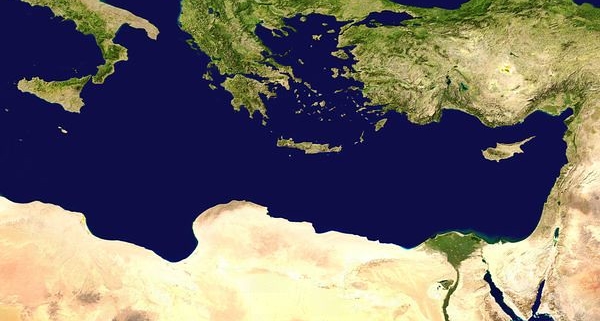
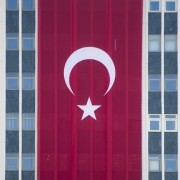
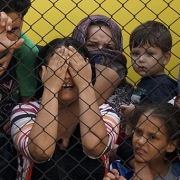
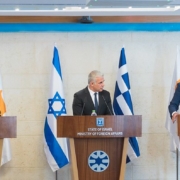
 176th Wing Alaska Air National Guard's photostream
176th Wing Alaska Air National Guard's photostream 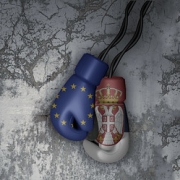
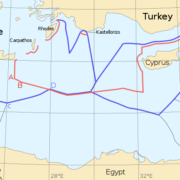



Leave a Reply
Want to join the discussion?Feel free to contribute!